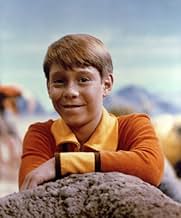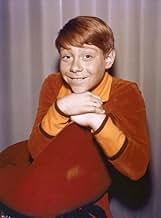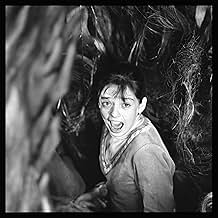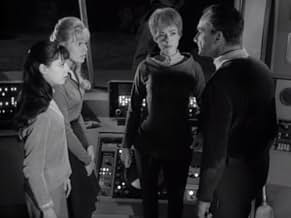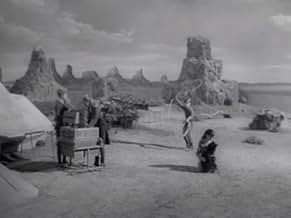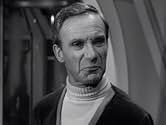Eine Weltraumkolonie-Familie kämpft ums Überleben, als ein Spion/versehentlicher blinder Passagier ihr Schiff hoffnungslos vom Kurs abbringt.Eine Weltraumkolonie-Familie kämpft ums Überleben, als ein Spion/versehentlicher blinder Passagier ihr Schiff hoffnungslos vom Kurs abbringt.Eine Weltraumkolonie-Familie kämpft ums Überleben, als ein Spion/versehentlicher blinder Passagier ihr Schiff hoffnungslos vom Kurs abbringt.
- Für 2 Primetime Emmys nominiert
- 1 Gewinn & 5 Nominierungen insgesamt
Folgen durchsuchen
Handlung
WUSSTEST DU SCHON:
- WissenswertesJune Lockhart had the biggest parking space on the "20th Century-Fox" lot because she would often drive her favorite vehicle to work - a 1923 fire engine.
- PatzerThe Robot is mounted on tracks. Yet in close-ups when it moves with a normal walking action and it is possible to see the actors legs move in the lower parts of the suit.
- Alternative VersionenA pilot episode was filmed that did not include either Robot or Dr. Smith! This film was not broadcast in 1965 but was shown on TV and released to video in the 1990s.
- VerbindungenEdited into The Man from the 25th Century (1968)
Ausgewählte Rezension
I guess I'm alone in my views these days, but I've never agreed with the critics (or the vast audiences) that adore contemporary TV series like "Seinfeld" or "Friends."
For me, the best decade for TV (by a million miles) was the 1960s. It was truly a unique decade for television. Series produced then are totally unlike anything produced previously or since. I don't know what it was (perhaps someone spiked the water back then), but TV in the 1960s was unique. There was a certain sense of wonder, a certain sense of the fantastic---and a definite 60s vibe of surrealism that crept into every show from "Green Acres" to "Batman" to "Gilligan's Island."
And for my money, the best show in TV's greatest decade was "Lost in Space." It's impossible to describe what watching this show was like in the 1960s. It's an experience that simply can't be re-produced today. For a start, America was still an optimistic nation and we had an ambitious space program that would soon take us to the moon. For everyone who was young in the 60s, it seemed highly plausible that, we too, would get a chance to ride a rocket into space within our lifetimes. Little could we fathom that, after 1972, America wouldn't even land a person on the moon for 35 long years.
Today's TV shows are stiflingly dull and seem to be created by committees that cynically use focus groups to create their sterile product. "Lost in Space" is a million miles away from this creative process. In fact, it's the total opposite (and all the more brilliant for this).
The greatest science fiction always had a sense of wonder and mystery. "Lost in Space" captured the mystery of space---indeed, the show itself was actually quite bizarre. It's a far cry from the over-rated "Star Trek," which, instead of giving us a sense of mystery, followed an (increasingly stale) by-the-numbers formula.
And "formula" is precisely what one did NOT get in viewing "Lost in Space." Indeed, this show is so strange that, viewing it today, it seems like a relic from a lost civilization. It's hard, in fact, to really even fathom who the producers were targeting as their audience.
Naturally, there are cynics who hate this show, and fall over themselves pointing out the plot holes and the ignorance of "realism." To those folks, I say: Chill out. Even TV's "realistic" shows are NOT as realistic as they hyped to be. "Star Trek," for example, has plenty of flaws in its science. Even a highly-praised show like "ER," the medical drama, has plenty of inaccuracies (as any medical professional will tell you).
In many ways, "Lost in Space" does a wonderful job of capturing the essence of what made the 60s the greatest decade of the 20th century for TV, film, music, and culture in general. It's something we'll never re-capture in today's stale culture, dominated as it is by dull, overpaid celebrities. We've gone a long ways downhill from The Beatles to "American Idol."
For me, the best decade for TV (by a million miles) was the 1960s. It was truly a unique decade for television. Series produced then are totally unlike anything produced previously or since. I don't know what it was (perhaps someone spiked the water back then), but TV in the 1960s was unique. There was a certain sense of wonder, a certain sense of the fantastic---and a definite 60s vibe of surrealism that crept into every show from "Green Acres" to "Batman" to "Gilligan's Island."
And for my money, the best show in TV's greatest decade was "Lost in Space." It's impossible to describe what watching this show was like in the 1960s. It's an experience that simply can't be re-produced today. For a start, America was still an optimistic nation and we had an ambitious space program that would soon take us to the moon. For everyone who was young in the 60s, it seemed highly plausible that, we too, would get a chance to ride a rocket into space within our lifetimes. Little could we fathom that, after 1972, America wouldn't even land a person on the moon for 35 long years.
Today's TV shows are stiflingly dull and seem to be created by committees that cynically use focus groups to create their sterile product. "Lost in Space" is a million miles away from this creative process. In fact, it's the total opposite (and all the more brilliant for this).
The greatest science fiction always had a sense of wonder and mystery. "Lost in Space" captured the mystery of space---indeed, the show itself was actually quite bizarre. It's a far cry from the over-rated "Star Trek," which, instead of giving us a sense of mystery, followed an (increasingly stale) by-the-numbers formula.
And "formula" is precisely what one did NOT get in viewing "Lost in Space." Indeed, this show is so strange that, viewing it today, it seems like a relic from a lost civilization. It's hard, in fact, to really even fathom who the producers were targeting as their audience.
Naturally, there are cynics who hate this show, and fall over themselves pointing out the plot holes and the ignorance of "realism." To those folks, I say: Chill out. Even TV's "realistic" shows are NOT as realistic as they hyped to be. "Star Trek," for example, has plenty of flaws in its science. Even a highly-praised show like "ER," the medical drama, has plenty of inaccuracies (as any medical professional will tell you).
In many ways, "Lost in Space" does a wonderful job of capturing the essence of what made the 60s the greatest decade of the 20th century for TV, film, music, and culture in general. It's something we'll never re-capture in today's stale culture, dominated as it is by dull, overpaid celebrities. We've gone a long ways downhill from The Beatles to "American Idol."
- thommickel
- 7. Juni 2007
- Permalink
Top-Auswahl
Melde dich zum Bewerten an und greife auf die Watchlist für personalisierte Empfehlungen zu.
Details
- Erscheinungsdatum
- Herkunftsland
- Sprache
- Auch bekannt als
- Lost in Space
- Drehorte
- Produktionsfirmen
- Weitere beteiligte Unternehmen bei IMDbPro anzeigen
- Laufzeit1 Stunde
- Farbe
Zu dieser Seite beitragen
Bearbeitung vorschlagen oder fehlenden Inhalt hinzufügen





